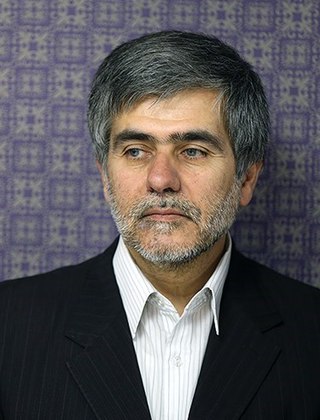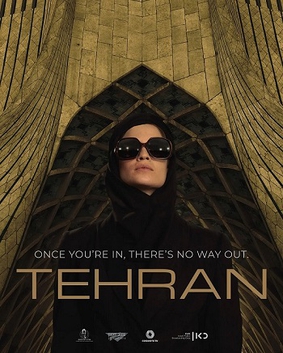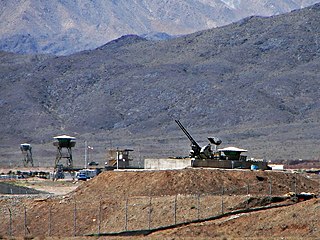
Evin Prison is a prison located in the Evin neighborhood of Tehran, Iran. The prison has been the primary site for the housing of Iran's political prisoners since 1972, before and after the Iranian Revolution, in a purpose-built wing nicknamed "Evin University" due to the high number of students and intellectuals detained there. Evin Prison has been accused of committing "serious human rights abuses" against its political dissidents and critics of the government.

Kazem Radjavi was an Iranian university professor known for his work as a human rights advocate. He was also the elder brother of Iranian Mujahedin leader Massoud Rajavi. When, in 1971, Massoud Rajavi was arrested and sentenced to death, Kazem Rajavi managed to prevent the execution by forming an international campaign and changing the verdict to life imprisonment.
Ardeshir Hosseinpour was an Iranian nuclear scientist, physics professor, and electromagnetism expert, who was involved in the Iranian nuclear program. He died mysteriously in early 2007 during his nuclear work at Isfahan.

Ali-Reza Asgari is an Iranian who served as a general in the Islamic Revolutionary Guards Corps, as deputy defense minister, and as a cabinet member of Iranian President Mohammad Khatami.

Mohsen Fakhrizadeh Mahabadi was an Iranian nuclear physicist and scientist. He was regarded as the chief of Iran's nuclear program.

Massoud Ali-Mohammadi was an Iranian quantum field theorist and elementary-particle physicist and a distinguished professor of elementary particle physics at the University of Tehran's Department of Physics. Alimohammadi was the first PhD graduate student in physics of the Sharif University of Technology. He published some 53 articles and letters in peer-reviewed academic journals and wrote and translated several physics textbooks, including Modern Quantum Mechanics, revised edition, by J. J. Sakurai, which he translated from English into Persian in collaboration with Hamidreza Moshfegh.

The Institute for Intelligence and Special Operations, popularly known as Mossad, is the national intelligence agency of the State of Israel. It is one of the main entities in the Israeli Intelligence Community, along with Aman and Shin Bet.
Events in the year 2010 in the Islamic Republic of Iran.
Majid Shahriari was a top Iranian nuclear scientist and physicist who worked with the Atomic Energy Organization of Iran. He was assassinated in Tehran in November 2010, allegedly by Israel's Mossad.

Fereydoon Abbasi-Davani is an Iranian nuclear scientist who was head of the Atomic Energy Organization from 2011 to 2013. He survived an assassination attempt in 2010, but was wounded. He is a conservative and principlist politician.

Mostafa Ahmadi Roshan was an Iranian nuclear scientist who was assassinated in 2012. He was also deputy of commerce at the Natanz nuclear power plant.
Between 2010 and 2020, five Iranian nuclear scientists were killed in foreign-linked assassinations. Rezaeinejad was shot dead by gunmen on motorcycles, while Shahriari and Ahmadi Roshan were killed by explosives attached to their cars. Fereydoon Abbasi was also targeted in a car bombing, but survived.

Tehran is an Israeli spy thriller television series created by Moshe Zonder for the Israeli public channel Kan 11. Written by Zonder and Omri Shenhar and directed by Daniel Syrkin, the series premiered in Israel on 22 June 2020 and 25 September internationally on Apple TV+.

Navid Afkari Sangari was an Iranian wrestler who was sentenced to death and executed in Shiraz after having been accused and convicted of murdering a security guard during the 2018 Iranian protests; sources from outside Iran also cited convictions on other charges related to Afkari's participation in the protests, while Iranian sources denied that the case had any connection to the protests. Afkari had filed a complaint with the Iranian judiciary, and stated in an audiotape recording that was smuggled from prison, that his initial confession had been obtained under torture; the Iranian judiciary denied the torture claims, and Iranian state media broadcast a recording of the confession. There were worldwide calls for Afkari to be pardoned, including by International Olympic Committee President Thomas Bach, and by then U.S. president Donald Trump. Afkari's brothers Vahid and Habib were sentenced to 54 and 27 years, respectively, in prison in the same case.
Hassan Sayyad Khodaei was an Iranian military officer who served in the Islamic Revolutionary Guard Corps (IRGC). Serving as a Holy Shrine Defender, he was assassinated on 22 May 2022 by motorcycle-riding gunmen in front of his home. Iran has blamed the assassination on "global arrogance," a term used to refer to the United States and its allies, such as Israel. According to the Wall Street Journal, the New York Times and other sources citing people familiar with the matter, Khodaei planned kidnappings and killings for an arm of the IRGC known as Quds Force Unit 840, including failed plots to kill an Israeli diplomat, an American general and a French intellectual.
Death sentences during the Mahsa Amini protests is a list of Iranian citizens sentenced to death or charged with crimes punishable by death in the Islamic Republic of Iran during the Mahsa Amini protests. Following rushed trials that were widely criticized by human rights organizations, the Islamic Republic has executed eight protestors, Mohsen Shekari, Majidreza Rahnavard, Mohammad Mehdi Karami, Seyyed Mohammad Hosseini, Saleh Mirhashemi, Majid Kazemi, Saeed Yaghoobi and Mohammad Ghobadloo. Dozens of protesters have been charged with offenses that are punishable by death in Iran.

The Gaza War (2008–2009) was accompanied by the stance of many countries and organizations in the world. In Iran, the war were accompanied by the reaction of the people and government officials. The most important of these reactions are the Fatwa of Jihad by Ali Khamenei, the Supreme Leader of Iran, and the sit-in and attack on foreign embassies.

Operations attributed to Israel in Iran is a list of subversive operations in Iran that have been attributed to Israel in the public opinion or the speech of Iranian officials. Israel has not officially claimed responsibility for many of these operations. Israeli authorities have always presented themselves in opposition to the Islamic Republic of Iran and their propagated ideas.

Dariush Rezaeinejad was an Iranian electrical engineering PhD student from K. N. Toosi University of Technology, who was killed in front of his home. Iran's Intelligence Minister Heydar Moslehi said he was "not active in nuclear projects and has nothing to do with the nuclear issue." However, the Associated Press news agency, in a report quoting a foreign official and a former UN nuclear inspector, wrote that Rezaeinejad's research was about high-voltage switches, which are considered an important part in the construction of nuclear warheads in atomic weapons.

The government of Israel believes that if the Islamic Republic of Iran achieves the development of nuclear weapons, the existence of Israel will be in serious danger and this regime will be the first target of a possible nuclear attack by Iran. Benjamin Netanyahu, the prime minister of Israel, who is mentioned as one of the supporters of Israel's "preemptive strike" on Iran's nuclear facilities, has repeatedly emphasized in official speeches that "all the risks are small and insignificant compared to the risk of Iran's nuclearization." The Iranian government has repeatedly emphasized that the country's nuclear program is for peaceful purposes such as energy production and medical issues, and is not seeking to build nuclear weapons.















